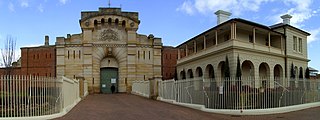
Port Arthur is a town and former convict settlement on the Tasman Peninsula, in Tasmania, Australia. It is located approximately 97 kilometres (60 mi) southeast of the state capital, Hobart.

Clarence City Council is a local government body in Tasmania, and one of the five municipalities that constitutes the Greater Hobart Area. The Clarence local government area has a population of 61,531, covering the eastern shore of the Derwent River from Otago to the South Arm Peninsula and the smaller localities of Cambridge, Richmond, and Seven Mile Beach.

The Brooker Highway is a highway in the Australian state of Tasmania. As one of Hobart's three major radials, the highway connects traffic from the city centre with the northern suburbs and is the major road connection to the cities and towns of northern Tasmania. With an annual average daily traffic of 48,000, the highway is one of the busiest in Tasmania. The Brooker Highway has recently been declared part of the National Highway.

Tasmania Police is the primary law enforcement agency of the Australian state of Tasmania. Established in 1899, the force has more than 1,300 officers policing Tasmania's population of over half a million people.

Risdon Prison Complex is an Australian medium to maximum security prison for males located in Risdon Vale near Hobart, Tasmania. The facility is operated by the Tasmanian Prison Service, an agency of the Department of Justice of the Government of Tasmania. The facility accepts criminals convicted under Tasmanian and/or Commonwealth legislation.
Parklea Correctional Centre, a privately managed Australian maximum and minimum security prison for males, is located at Parklea, in the north-western suburbs of Sydney, New South Wales. The facility is operated by MTC Ventia and has a current capacity for 1,350 inmates. The Centre accepts prisoners charged and convicted under New South Wales and/or Commonwealth legislation and incorporates a minimum-security work-release centre for inmates nearing release with a capacity of 120. A Compulsory Drug Treatment Correctional unit is incorporated within the centre.
The Hobart Reception Centre, formerly the Hobart Remand Centre, an Australian maximum security prison for male and female inmates held on remand, is located in Hobart, Tasmania. The facility is operated by the Tasmanian Prison Service, an agency of the Department of Justice of the Government of Tasmania. The facility accepts felons charged under Tasmanian and/or Commonwealth legislation pending legal proceedings; and also detains convicted felons, pending their classification and placement at other correctional facilities in Tasmania.
Mary Hutchinson Women's Prison, formerly Risdon Women's Prison, an Australian minimum to maximum security prison for females, is located in Risdon Vale, Tasmania. The facility is operated by the Tasmanian Prison Service, an agency of the Department of Justice of the Government of Tasmania. The facility accepts felons convicted under Tasmanian and/or Commonwealth legislation.

H.M. Gaol Hobart or Campbell Street Gaol, a former Australian maximum security prison for males and females, was located in Hobart, Tasmania. Built by convict labour, the gaol operated between 1821 until the early 1960s. In 1961, male inmates were transferred to the H.M. Risdon Prison and in 1963, female inmates were transferred to the Risdon Women's Prison.

Bathurst Correctional Centre, originally built as Bathurst Gaol in 1888, is a prison for men and women located in the city of Bathurst, New South Wales, Australia, and operated by the Department of Communities and Justice. Bathurst holds inmates sentenced under State or Australian criminal law, along with a small number of remand prisoners.
Launceston Reception Centre, formerly the Launceston Remand Centre, an Australian maximum security prison for male and female inmates held on remand, is located in Launceston, Tasmania. The facility is operated by the Tasmanian Prison Service, an agency of the Department of Justice of the Government of Tasmania. The facility accepts felons charged under Tasmanian and/or Commonwealth legislation pending legal proceedings; and also detains convicted felons, pending their classification and placement at other correctional facilities in Tasmania.

A super-maximum security (supermax) or administrative maximum (ADX) prison is a "control-unit" prison, or a unit within prisons, which represents the most secure level of custody in the prison systems of certain countries.

The Berrima Correctional Centre is an Australian prison, located at Berrima, New South Wales. The Centre was operational between 1839 and 2011 with a number of breaks in between, and was re-opened in September 2016. Initially established as Berrima Gaol, the facility closed in 1909 and reopened in 1949 as the Berrima Training Centre. The Centre is the oldest Australian correctional facility in operation. It was added to the New South Wales State Heritage Register on 2 April 1999.

Cadbury's Chocolate Factory is the largest chocolate factory in the Southern Hemisphere, producing a company-record of over 60,000 tonnes of chocolate in 2021. Established at Claremont, Tasmania in 1921, the factory and surrounding model village estate marked Cadbury's first business expansion outside the United Kingdom. Cadbury's Claremont is currently owned by the multinational conglomerate Mondelēz International, which purchased Cadbury in 2010.
Shan Eve Tennent is a former Australian judge. She was a Judge of the Supreme Court of Tasmania between March 2005 and October 2017, and was the first woman to be appointed to the Court.

Stephen Peter Estcourt is an Australian judge, who has been Puisne Judge of the Supreme Court of Tasmania since April 2013. From 2004 to 2013, he maintained barristers' chambers in Hobart and Melbourne, dividing his time between the two.

The 2013 Tasmanian bushfires were a series of bushfires which occurred in south-eastern Tasmania, Australia, between November 2012 and late April 2013. The fires burnt approximately 20,000 hectares of mixed resident land and native forest.
Crime in Tasmania has existed since the earliest days of the European settlement in 1803. Laws creating criminal offences are contained entirely in statutes, statutory regulations, and by-laws, common law offences having been abolished by the Criminal Code Act 1924 s 6. Most offences are enforced by Tasmania Police, although a small category of offences are prosecuted by other statutory authorities such as local governments, and the Tasmanian branch of RSPCA Australia. All offences are prosecuted through the Tasmanian justice system, and sentences of imprisonment are administered by the Tasmania Prison Service. Some crime statistics for Tasmania are provided on the Tasmania Police website.

Fabiano Cangelosi is an Australian barrister, based in Hobart, Tasmania. Cangelosi has been involved in a number of high-profile cases, and was between 2018 and June 2020 the Tasmanian President and Director of the Australian Lawyers Alliance. Since August 2022, Cangelosi has been an occasional contributor to Crikey, writing on Tasmanian legal and political affairs.

Risdon Zinc Works is a major zinc refinery located in Lutana, a suburb of Hobart, Tasmania, Australia. The smelter is one of the world’s largest in terms of production volume, producing over 280,000 tonnes annually of high-grade zinc, primarily as die-cast alloys and continuous galvanising-grade alloys. These products are exported for global markets and utilised in a wide range of industries and products, from building and infrastructure to transportation, business equipment, communications, electronics, and consumer goods. The facility produces zinc using the Roast, Leach, Electrowinning (RLE) method, creating leach byproducts, including cadmium, gypsum, copper sulphate, lead sulphate, sulphuric acid, paragoethite and leach concentrate. The refinery has been owned and operated by the global multi-metals business Nyrstar since 2007. Nyrstar Hobart works closely with the Nyrstar Port Pirie multi-metals smelter in South Australia. The facility is Tasmania's largest exporter, contributing 25% of the state's overall export value in 2013.













